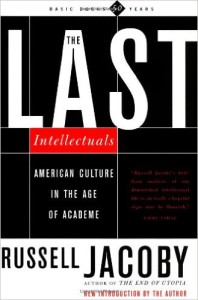 In preparation for my role as moderator of the plenary panel dedicated to rethinking Russell Jacoby’s book The Last Intellectuals: American Culture in the Age of Academe since it was first published 28 year ago (see full conference program here), I’ve been reading some of the book’s early reviews. Although the underlying premise of Jacoby’s argument—that for a host of structural reasons most intellectuals had found their way into academia or other large institutions and had thus become professionalized relative to their less attached predecessors—is inarguable, several vigorously disagreed with his lament about such a state of affairs.
In preparation for my role as moderator of the plenary panel dedicated to rethinking Russell Jacoby’s book The Last Intellectuals: American Culture in the Age of Academe since it was first published 28 year ago (see full conference program here), I’ve been reading some of the book’s early reviews. Although the underlying premise of Jacoby’s argument—that for a host of structural reasons most intellectuals had found their way into academia or other large institutions and had thus become professionalized relative to their less attached predecessors—is inarguable, several vigorously disagreed with his lament about such a state of affairs.
Reviewing Jacoby for the New Left Review (alongside Allan Bloom’s Closing of the American Mind
which was itself a statement of sorts) the dance critic and historian Lynn Garafola contended that Jacoby’s critique of young intellectuals was an exercise in victim blaming. Whereas Jacoby maintained that young left-wing intellectuals had walled themselves off from the public with academic jargon written only for specialized journals—as opposed to his venerable New York Intellectuals who wrote in the vernacular for a wider public—Garafola countered that Jacoby just didn’t look in the right places. Plenty of smart left-wing intellectuals were writing for innovative venues like October, Garafola maintained, and moreover that they would be fine with having their work published in more popular magazines like The New Republic or The New York Review of Books but that such venues did not publish left-wing ideas and in fact openly despised them.
Other such critical reviews are out there and worth reading, including one by Leo Ribuffo, who will be on the plenary panel in Washington D.C. There are also compelling retrospective essays. My favorite is Scott McLemee’s, which was published in a 2007 issue of BookForum. There is a lot to chew on in McLemee’s essay, including his recognition that Irving Howe anticipated Jacoby’s argument (sort of) by 30 years. But by far the best parts of McLemee’s essay are the last two paragraphs, which speak to the fact that the crisis in academia might just have the unintended consequence of detaching intellectuals from the compulsions of professionalization:
Unless, of course, that machinery accidentally re-creates some of the constitutive elements of the old cultural order: a body of surplus intellectuals who are not very well integrated into the system. Who have (for example) full access to the range of questions and ideas debated within scholarly networks but cannot find full-time employment in academic institutions—the products, but also the victims, of a system of higher education that is ever more dependent on a parttime labor force.
A group of writers and of thinkers—and even, who knows? of eloquent yellers—who enjoy no economic security and occupy low rungs on the status ladder, without much reason to think this will change. Such people, finding themselves excluded, might in time start wanting to “exclude the excluders.” Then the tenor of intellectual discourse might change, and public life with it; and a space for discussion might appear in which it would be possible to move in more than one dimension.
McLemee seems to have been a prophet here. In other words, perhaps the success of new left-wing “little magazines” like Jacobin, N + 1, and The New Inquiry (not to mention the transformations that have taken place at old “little magazines” like Dissent
and The New Republic
) is, as McLemee predicted, based on the precarious position that so many would-be academics have been thrown into.
By design, the first plenary session of the upcoming conference will address the question of “little magazines.”

One Thought on this Post
S-USIH Comment Policy
We ask that those who participate in the discussions generated in the Comments section do so with the same decorum as they would in any other academic setting or context. Since the USIH bloggers write under our real names, we would prefer that our commenters also identify themselves by their real name. As our primary goal is to stimulate and engage in fruitful and productive discussion, ad hominem attacks (personal or professional), unnecessary insults, and/or mean-spiritedness have no place in the USIH Blog’s Comments section. Therefore, we reserve the right to remove any comments that contain any of the above and/or are not intended to further the discussion of the topic of the post. We welcome suggestions for corrections to any of our posts. As the official blog of the Society of US Intellectual History, we hope to foster a diverse community of scholars and readers who engage with one another in discussions of US intellectual history, broadly understood.
Thanks for this teaser!, I am excited about both these panels now.
I think McLemee is right on target; I feel like I am witnessing, and am a part of, the development he talked about there. To add a personal note, a lot of leftist intellectuals in my generation were trained by an increasingly neoliberal academy that repeatedly let us down, which has left many of us with a desire to work outside of it in some form, since, it is becoming increasingly evident, it operates more and more as an organ of neoliberalism rather than a bulwark against it.